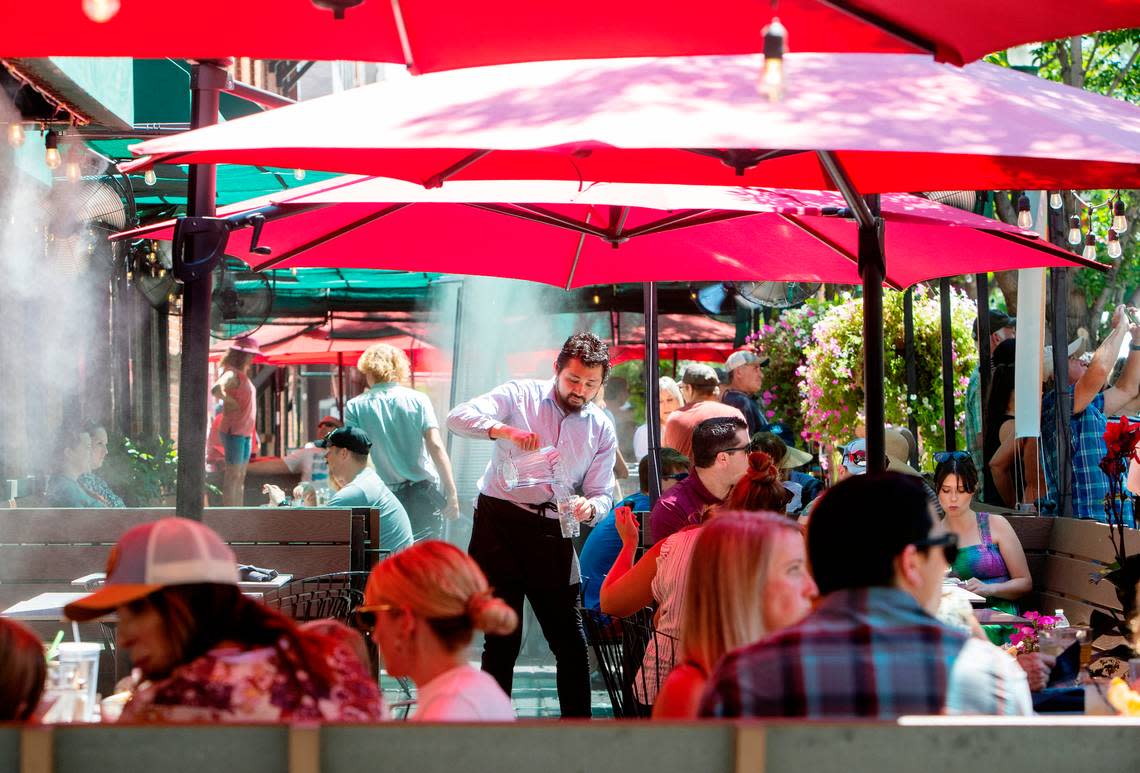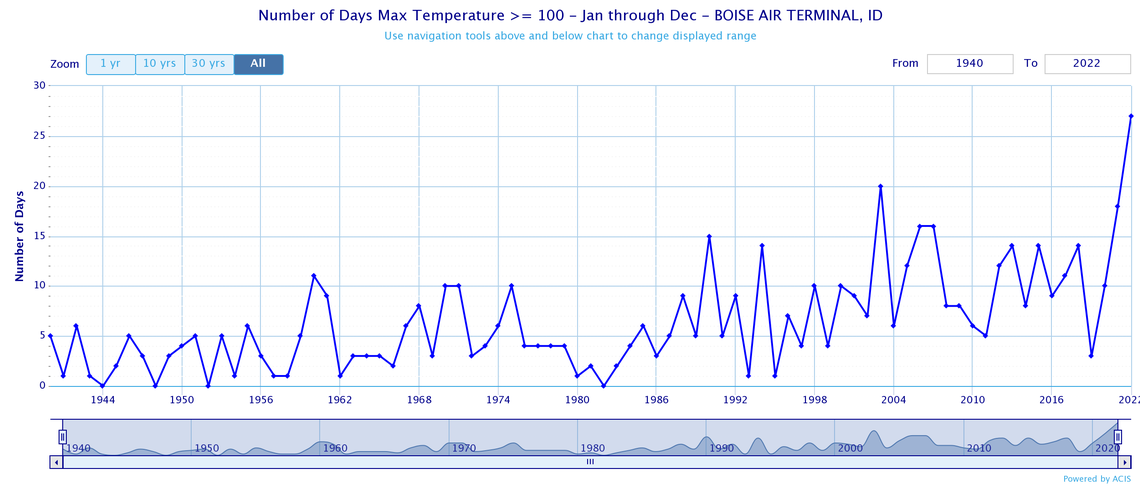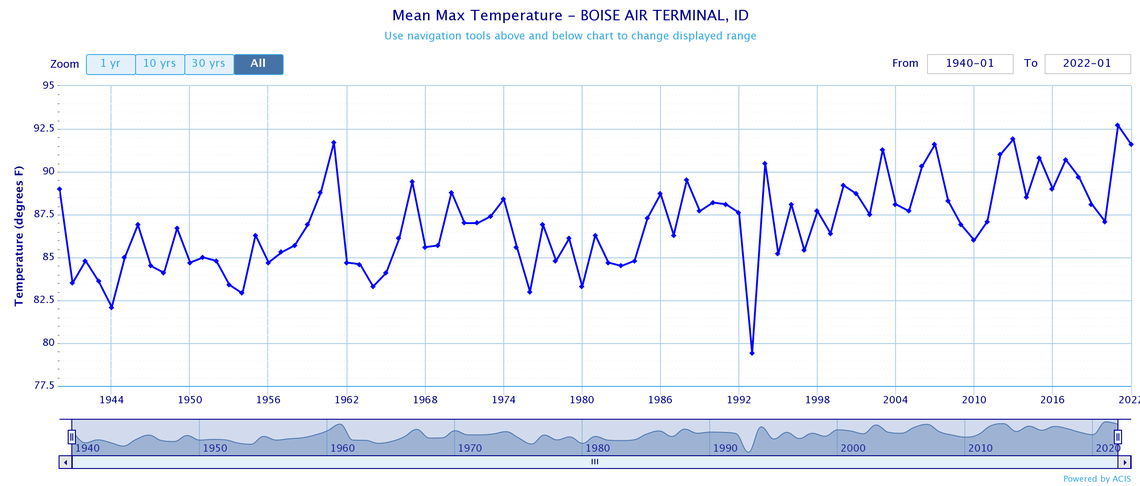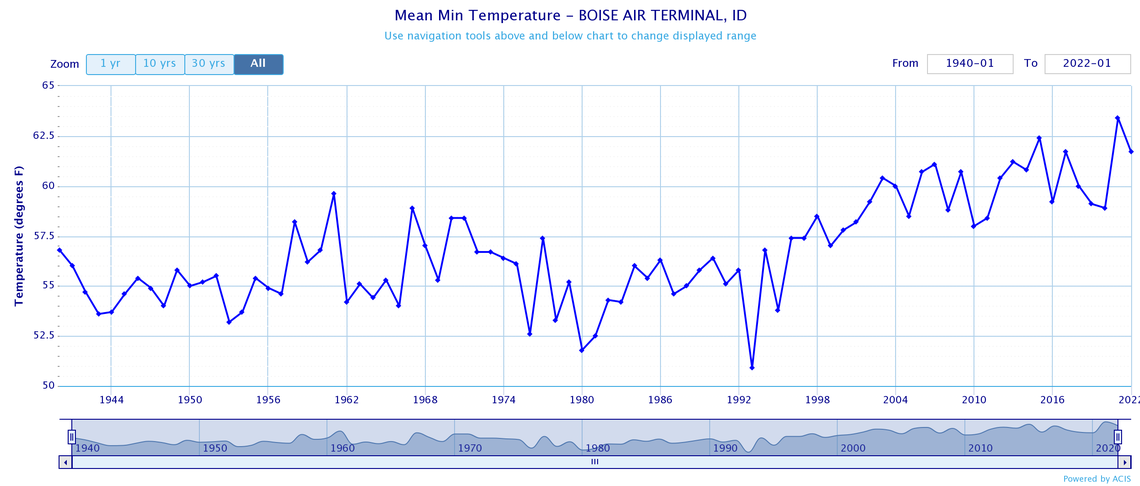It was one of the hottest summers ever. Here are the numbers behind Boise’s record heat
There’s a new adage among climatologists and meteorologists that’s been making the rounds in recent years. It’ll elicit a few wry chuckles from those who hear it, but somber expressions of worry and concern quickly replace those laughs:
“This summer will now be the coolest summer we experience.”
The saying was told to the Idaho Statesman by Benjamin Hatchett, an assistant research professor with the Desert Research Institute. And although not a guaranteed truth each year, it is becoming a trend that each summer is hotter than the last.
Ten of the 12 hottest summers in Boise have come since the turn of the 21st century, including four of the top five since 2013.

One of those top five summers just occurred. With an average temperature of 76.6 degrees, 2022 ranked as the second-hottest summer in Boise history, trailing only 2021, which had an average temperature of 78 degrees, according to data from the National Weather Service.
It also ties for second with 2015 and 1869.
The meteorological summer is defined as June through August, which differs from the astronomical summer, which starts with the summer equinox and ends with the autumnal; this year, those two events landed on June 21 and Sept. 22, respectively.
“We absolutely expect, on average, to have more summers like this one and continually warming,” Hatchett told the Idaho Statesman.
“There will probably be some relatively cooler periods going forward,” Hatchett continued, “but climate change stacks the deck in favor of pulling warmer average cards and more extreme hot cards.”

Record-setting summer
Along with recording the second-hottest summer in Boise history, the City of Trees also recorded two other heavy-hitting records: the hottest August and the most days at or above 100 degrees.
The city also recorded new record-high temperatures on three dates through the summer and two more in September.
Breaking the triple-digit barrier
Throughout the summer months, Boise hit the triple-digit mark on 23 occasions and, including September, pushed that total up to 27 days. It’s a total that blows the previous record of 20 days in a calendar year, set in 2003, out of the water.
En route to breaking that record, Boise set new record-high temperatures on five occasions:
July 29: 104 (tied with 1934)
Aug. 17: 103
Aug. 31: 106
Sept. 6: 101
Sept. 7: 104
Although not part of the meteorological summer, the high temperature on Sept. 7 of 104 degrees is a new record for the hottest temperature in September. Boise also hit the 100-degree mark on three other occasions in September for a total of four days, breaking the previous record of two days set in 2020.

“It tends to be a gradual trend toward more days in recent years of being over 100,” National Weather Service Boise meteorologist Les Colin told the Statesman. “We haven’t stayed under 100 the whole summer since 1982. And prior to that, we used to do that about every 20 years. Now, it looks like we’ll never do it.”
Hottest August
Boise’s average temperature in August was 81.9 degrees, including 16-straight days with a high of at least 95 degrees. It’s the first time that Boise has recorded an average August temperature above 80 degrees, according to Weather Service meteorologist Joel Tannenholz, and it easily surpasses the previous record of 78.7 degrees set in 2001.
August 2022 also ranks as the third-hottest month in Boise history, trailing only July 2021 (83.8) and July 2007 (83.1).
Unsurprisingly, the average high and low temperatures far exceeded what is typically seen in August. The average high in August 2022 was 96.8 degrees, compared to the historical average of 90.7 degrees, while the average low was 67.1 degrees, far above the historical average of 60.8 degrees.
Second-hottest summer
Another record could have been on the cards if not for a fairly average June. The start of the summer showed no indications of the intense heat Boise was in store for, falling narrowly below the average temperature for the month — 67.3 degrees compared to the historical average of 67.8 degrees.
But an above-average June — 80.7 degrees average compared to the historical average of 77.3 degrees — and the sweltering August detailed above pushed 2022’s summer up the rankings.
Here are some key notes from the summer, including averages since records began in 1875:
There were 23 days above 100 degrees, a new record. The average is five days.
There were 47 days above 95 degrees. The average is 20 days.
There were 62 days above 90 degrees. The average is 45 days.
There were 76 days above 85 degrees. The average is 70 days.
WARMEST AUGUST on RECORD at BOISE. For the summer, it goes down as the 2nd warmest summer on record, with the most 100 degree days in a season with 23. We have a chance to add a few more 100 degree days in the next several. #idwx #orwx pic.twitter.com/TD5hSNjagv
— NWS Boise (@NWSBoise) September 1, 2022
Climate change to blame?
It’s an easy answer to pin rising temperatures on climate change alone, but looking at long-term trends shows a gradual rise over time.
The average summer temperature for Boise in the 1940s was consistently in the low-to-mid 80-degree range, according to data from the Applied Climate Information System, which is powered by the National Oceanic and Atmospheric Administration.

“The late 1950s to early 1960s had rapid warming occur, but note that this quickly returned to normal,” Hatchett said. “Compare this to the last several decades and the consistent march upwards.”
A series of heatwaves in the 1950s briefly produced a spike in the average high temperature — similar to what is seen on average today — before returning to normal by 1960. In the more than 60 years since, the average high has increased from the low-to-mid 80s to the high 80s or low 90s.
It’s not just the sun that is warming Boise, either. The increase in warming minimum temperatures — which have increased from the low 50s in the 1990s to the low 60s just 30 years later — means larger cities are struggling to cool down during the night.
Warmer nights then mean warmer days, and people using air conditioning more regularly.
“The warming minimums is extra concerning because we no longer can recover during cool nights from hot days,” Hatchett said. “Meaning we spend more money on air conditioning and expel more waste heat into the city, helping warm it further.”

